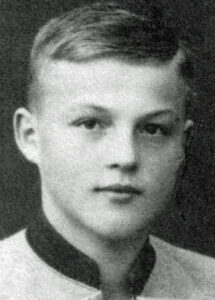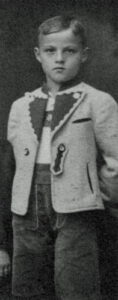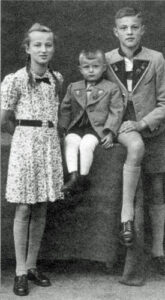Mail Correspondence with Soldiers at War (“Feldpostbriefe”): Letter from 16-year-old German soldier Franz Krügner to his family, 7 April 1945 (Published on 18/01/2023)
Feldpostbriefe and their significance today
When researching Julius Erasmus, one inevitably comes into contact with letter correspondence between soldiers at war and their families from the time of the Second World War, such correspondence being called “Feldpostbriefe” in German. Be it messages about the death of a soldier, written by his superior to his relatives, which were later sent to Mr Erasmus as a hint for a grave search, or other correspondence between soldiers at war and their families at home. Since then, I have also been dealing more closely with field post letters from that time.
Feldpostbriefe are valuable contemporary documents that unfold their timeless message, especially in times like the present, and convey a vivid impression of what war means to all involved. They are a valuable tool to ward off the very beginnings of a renewed striving for war and perhaps to help prevent history from repeating itself once again and with yet more gruesome consequences for mankind. At present, war, weapons and the killing of people on a large scale are once again being drummed up forcefully, although for decades one could have had the vague hope that mankind had finally learned its lesson to some extent from the painful experiences of two world wars in particular. Unfortunately, this does not seem to be the case once again.
With this in mind, appropriate letters or letter excerpts from various sources will be published here from time to time in the section “Mail Correspondence with Soldiers at War (Feldpostbriefe)” as a reminder of what war means to man and mankind. To provide food for thought and in the unshakable hope that this may make a difference.
Letter from 16-year-old German soldier Franz Krügner to his family from Prague-Rusin, 7 April 1945
(Source: Volksbund Deutsche Kriegsgräberfürsorge, Letzte Lebenszeichen II – Briefe aus dem Krieg, p. 102 f. (translation from German language)):
“My dear parents and brothers and sisters!
The best and last greetings from Rusin are sent to you by your son and brother Franz. As I have already written to you, we are on the alert. But we have suddenly received marching orders and will be leaving here for the front on Monday or Tuesday. We were just unlucky that you could not visit me. At the most, if you get the letter in time, Dad and Mom could come immediately to Rusin to the barracks.
I wanted to send the civilian things home under all circumstances, but it is impossible. If you can’t come, I’m afraid I’ll have to sell them for food and money. I can only take the shoes and the HJ [‘HJ’ for ‘Hitler Youth’] shirt with me. I’m very sorry, but I can’t take it with me to the front. But the main thing is that we win the war, and above all that I come home ‘healthy’ again. But every bullet doesn’t hit, so now it’s just a matter of being a lucky soldier and gritting my teeth. And if I don’t have the luck to return home, then don’t despair and take comfort with the others. But, dear parents and brothers and sisters, we all trust in God, because the Almighty will take care of it.
I wish my dear little Horstl good luck for his first day at school. And good luck to Liesl for the future.
So, dear parents and brothers and sisters,
a thousand greetings from
your brother and son Franz.”
Grenadier Franz Krügner, born on 6 December 1928 in Voitsdorf in the Ore Mountains, was called up for the Reich Labor Service in January 1945 at the age of 16 and was taken over by the Wehrmacht two months later. He was deployed as a soldier from 8 April 1945, and died at the field hospital at 8:35 a.m. on 13 May 1945, as a result of severe shrapnel wounds to the head and right hand.
Franz Krügner rests on the war gravesite in Linz-St. Martin (Austria).
(Head picture: Ehrenfriedhof Bad Bodendorf, September 2021)
If you wish to support my work on Julius Erasmus, you can do so here. Many thanks!




